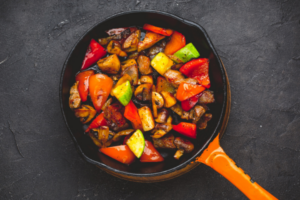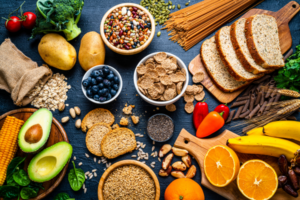The World of Private Label Food Manufacturing
The food industry is vast and ever-evolving, with private-label food manufacturing standing out as a significant trend. As more companies venture into creating their unique products, the demand for private label manufacturers has surged. This blog delves into the nuances of private-label food manufacturing, its differences from other manufacturing methods, and its growth potential, mainly through platforms like Amazon.
Understanding Private Label Food Manufacturing
Private-label food manufacturing involves companies producing food items marketed and sold under another company’s brand name. This is distinct from contract manufacturing, where a company hires another to produce goods based on the former’s specifications, and white label manufacturing, where generic products are made and rebranded by various companies. National brands, on the other hand, are products created and sold by the same company, often recognized by their extensive marketing and established presence.
The Rise of Store Brands
Private label brands, or store brands, have seen substantial growth in recent years. These brands offer retailers higher profit margins and consumers more affordable alternatives to national brands without compromising quality. Amazon has been a significant player in this market, providing a platform for numerous sotre brands to reach a global audience. Successful private-label brands on Amazon include Happy Belly, AmazonFresh, and Wickedly Prime.

Key Players in the Private Label Food Manufacturing Industry
Several food manufacturers have specialized in producing high-quality private-label products. These manufacturers often operate behind the scenes, yet they play a crucial role in the supply chain. Examples include companies like TreeHouse Foods, which produces a wide range of grocery items, and Mount Franklin Foods, a leading gummy manufacturer. The PLMA trade show (Private Label Manufacturers Association) is a significant event where manufacturers and retailers converge to explore new opportunities and partnerships in the sector.
Popular Private Label Food Products
Private label products span various categories, each tailored to meet specific consumer needs. Here are some famous examples:
- Gummy Products: Gummy vitamins and snacks have become a staple in many households. Companies like NutraBlast are known for their high-quality gummy vitamins.
- Jerky: Jerky has gained popularity due to its high protein content and convenience. Brands like KRAVE Jerky have found success in this category.
- Hot Sauce: Spicy condiments like hot sauce are another favorite, with companies creating unique blends to differentiate themselves.
- Ketchup and Other Condiments: Staples like ketchup, mustard, and mayonnaise are frequently offered under private label brands, often matching or exceeding the quality of national brands.
- Gum: Chewing gum, with its various flavors and packaging styles, is a standard private-label item in many grocery stores.
- Baking Mixes: From cakes to cookies, baking mixes allow consumers to enjoy homemade flavors with convenience.
- Seasoning Mixes and Spice Blends: Seasoning mixes and spice blends offer a wide array of flavors, catering to diverse culinary preferences.
- Pancake and Waffle Mix: Quick and easy to prepare, these mixes are popular breakfast staples.
- Soup Blends: Ready-to-cook soup blends provide a hearty meal solution, aligning with the trend towards easy and nutritious food options.
Advantages of Private Label Food Manufacturing
- Cost-Effectiveness: Products are often more affordable for consumers and profitable for retailers due to lower marketing and distribution costs.
- Customization: Retailers can tailor products to meet specific market demands, offering unique flavors, packaging, and nutritional profiles.
- Quality Control: By working closely with manufacturers, retailers can ensure their products meet high-quality standards, fostering customer trust and loyalty.
- Brand Differentiation: Private label brands allow retailers to differentiate themselves from competitors by offering exclusive products.
Challenges & Considerations
While private-label manufacturing offers numerous benefits, it also comes with challenges:
- Quality Assurance: Ensuring consistent product quality is crucial to maintaining consumer trust.
- Supply Chain Management: Efficient logistics and inventory management are essential to meet consumer demand and avoid stockouts.
- Regulatory Compliance: Following food safety regulations and labeling requirements is critical to avoid legal issues.
The Future of Private-Label Food Manufacturing
The market is poised for continued growth, driven by increasing consumer demand for affordable yet high-quality products. The shift towards online shopping, accelerated by the COVID-19 pandemic, has further boosted the visibility and popularity of private label brands. Amazon, with its vast reach and robust logistics network, will likely remain a key platform.
Conclusion
Private-label food manufacturing offers a wealth of opportunities for retailers and manufacturers alike. By focusing on quality, innovation, and strategic partnerships, companies can create successful brands that resonate with consumers. Whether through unique gummy products, flavorful hot sauces, or everyday essentials like ketchup and jerky, the potential for growth is immense. As the industry evolves, staying informed about trends and best practices, such as those showcased at the PLMA trade show, will be crucial for sustained success.

Summer Grilling Blends to Savor the Season
Get ready to turn up the heat this summer with a lineup of grill-worthy seasonings that bring bold flavor and ease to every cookout. From smoky BBQ rubs to zesty citrus herb blends, this blog dives into the must-have seasonings that elevate everything from veggies to meats. Whether you’re crafting your own blends or sourcing ready-to-go options, St. Charles Trading has the ingredients and blending capabilities to help you meet the demand for exciting, crave-worthy grilling experiences.

Nutrient-Dense Food Additions: Nutrition in the GLP-1 Era
As GLP-1 medications reshape eating habits, the food industry is responding with innovative nutrient-dense additions that pack maximum nutrition into minimal volume—creating powerful solutions for consumers seeking quality over quantity in their diets.

GLP-1 Dietary Fibers: The Next Big Opportunity in Food
Discover how the GLP-1 medication boom is creating unprecedented demand for fiber-enriched food products. Learn which dietary fibers best complement these medications and how forward-thinking manufacturers are capitalizing on this growing market segment with innovative formulations.
